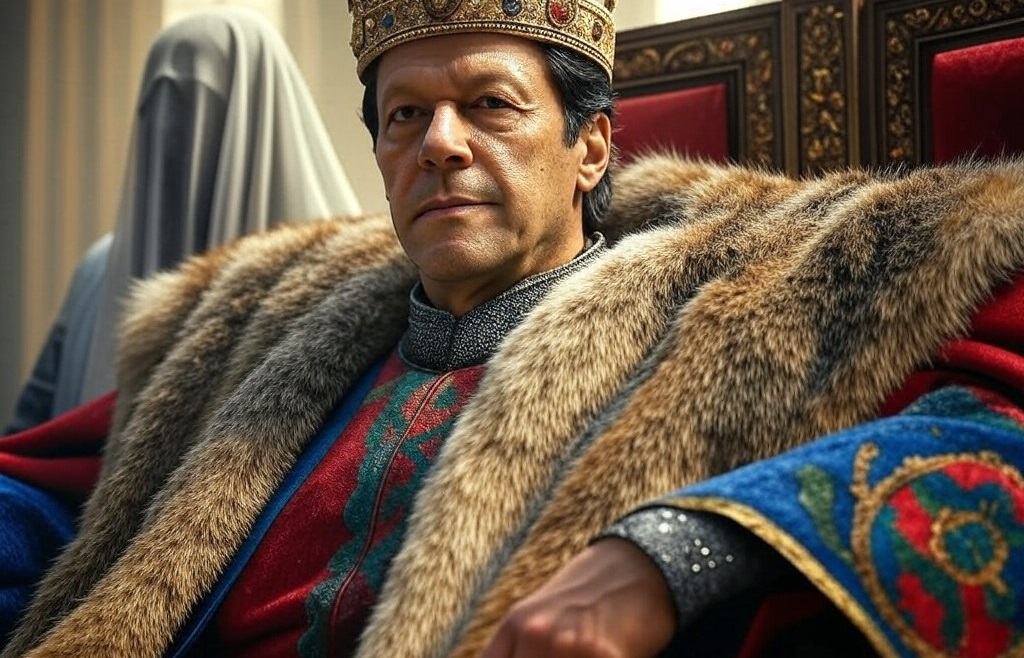Throughout history, many rulers and kings, once powerful and respected, have seen their thrones, empires, and reputations crumble due to the influence of women in their lives. While history often highlights the role of women as behind-the-scenes influencers, it also provides cautionary tales about how misplaced trust, manipulation, or excessive dependence on personal relationships can disrupt the paths of even the most promising leaders. In today’s context, the political turmoil surrounding Imran Khan, Pakistan’s former prime minister, and the alleged influence of his wife, Bushra Bibi, may exemplify this timeless phenomenon.
Historical Precedents: Women Who Altered the Course of Empires
1. Cleopatra and Julius Caesar/Mark Antony
Cleopatra’s connections with two of Rome’s most influential figures, Julius Caesar and Mark Antony, are often seen as crucial turning points in history. Plutarch, in his Lives, recounted how Mark Antony’s obsession with Cleopatra caused him to overlook his responsibilities to Rome, ultimately resulting in his defeat at the Battle of Actium. Historians such as Adrian Goldsworthy have pointed out that Antony’s choice to prioritize Cleopatra over his political alliances in Rome ultimately contributed to his demise and suicide.
2. Marie Antoinette and King Louis XVI
The influence of Marie Antoinette on King Louis XVI has been a topic of much discussion. In his work, The French Revolution: A History, Thomas Carlyle depicted her as a representation of royal extravagance, which stoked public resentment towards the monarchy. Although some historians contend that her impact has been overstated, revolutionary figures like Camille Desmoulins claimed she interfered in government matters and depleted the treasury with her opulent way of life, factors that played a role in the downfall of the monarchy.
3. Empress Dowager Cixi of China
Empress Dowager Cixi’s influence over the Qing Dynasty has sparked both praise and condemnation. Historian Sterling Seagrave, in his book Dragon Lady: The Life and Legend of the Last Empress of China, argues that her emphasis on consolidating her own power frequently hindered the empire’s modernization initiatives. Reformers such as Kang Youwei held her responsible for blocking essential reforms, which ultimately contributed to the downfall of the Qing Dynasty.
4. Anne Boleyn and Henry VIII
Anne Boleyn’s relationship with Henry VIII is extensively covered in works such as The Life and Death of Anne Boleyn by Eric Ives. Ives and other historians emphasize how her influence over Henry contributed to England’s separation from the Catholic Church, resulting in significant political and religious consequences. Ambassador Eustace Chapuys, in his communications to the Holy Roman Emperor, often condemned Anne’s part in distancing Henry from influential allies and inciting internal conflict.
5. Wallis Simpson and Edward VIII
Wallis Simpson’s relationship with Edward VIII and its effects on the British monarchy are thoroughly explored in Philip Ziegler’s King Edward VIII. Ziegler details how Edward’s choice to marry Wallis Simpson, an American who had been divorced twice, led to a constitutional crisis that ultimately compelled him to abdicate. Accounts from politicians of the time, including Stanley Baldwin, highlight the significant disapproval from the British establishment.
The Case of Imran Khan and Bushra Bibi
Imran Khan, the charismatic leader of Pakistan’s PTI (Pakistan Tehreek-e-Insaf) party, represents hope and change for countless Pakistanis. However, recent events in his political journey have sparked worries about the alleged influence of his wife, Bushra Bibi, on his decision-making. To gain a clearer perspective, we should examine the similarities between historical cases and Imran Khan’s present situation.
1. The Rise of Spiritual Influence
Bushra Bibi, frequently referred to as a spiritual guide and advisor, has allegedly had a considerable impact on Imran Khan’s decision-making process. Although spirituality is inherently personal, critics contend that an excessive dependence on mystical beliefs and spiritual advisors has diverted Imran Khan from practical governance. Throughout history, leaders who permitted mystical or unconventional influences to shape state policies have often encountered pushback from rationalist groups within their courts and among the populace.
2. Alienation of Key Allies
Just as Mark Antony’s alliance with Cleopatra alienated him from Rome’s Senate, Imran Khan’s perceived prioritization of Bushra Bibi’s advice over seasoned political allies has created fissures within his party and with institutional stakeholders. Allegations have it that from posting of Usman Buzdar, alienation of Jahangir Tareen to bureaucratic shuffles, Bushra Bibi had a vital role. Reports of favoritism towards individuals linked to Bushra Bibi have fueled allegations of corruption and nepotism, weakening Imran Khan`s political standing and highlighting a potentially major blind spot
3. Legal Troubles and Their Link to Bushra Bibi
Imran Khan currently faces numerous legal challenges, ranging from corruption allegations to misuse of power. A significant number of these cases have been linked to decisions allegedly influenced by Bushra Bibi or her close associates. For example, the Al-Qadir Trust case, involving accusations of improper land deals has drawn scrutiny over the couple’s involvement. Although Imran Khan was not a direct benefactor in any of those cases, this still mirrors historical instances where rulers’ spouses or close confidants became focal points for scandals that tarnished their reigns.
4. Public Perception and Loss of Credibility
In politics, perception can often hold more weight than reality. Similar to how Marie Antoinette’s detachment from the French populace alienated her, the allegations against Bushra Bibi could tarnish Imran Khan’s reputation as a steadfast reformer. Detractors claim that his steadfast support for Bushra Bibi may have made him oblivious to valid concerns, resulting in significant strategic errors.
Potential Lessons for Imran Khan ?
1. Separation of Personal and Political Spheres
History shows us that leaders who mix personal relationships with state matters often face serious consequences. Imran Khan needs to make sure that his choices are clear, practical, and not swayed by personal biases.
2. Rebuilding Trust with Allies and Institutions
To regain political momentum, Imran Khan needs to repair relationships with dissatisfied allies, although the matters seem to have reached a point where return seems impractical but politics is a game of balance between popular and strategic decisions. Achieving this would involves showing independence in his decision-making and tackling issues related to nepotism and favoritism.
3. Learning from History
The stories of rulers such as Mark Antony, Louis XVI, and Edward VIII highlight the need to balance personal loyalty with political pragmatism. Imran Khan’s political future hinges on his ability to absorb these lessons and prioritize the greater good over personal ties.
The impact of women on rulers is a recurring theme throughout history, providing both inspiration and cautionary examples. While women have often been unjustly blamed for men’s failures, it is ultimately the leaders’ duty to exercise discernment in their relationships and governance. For Imran Khan, the lessons from history are unmistakable: to secure his legacy and navigate the challenging landscape of Pakistani politics, he must follow a path defined by reason, accountability, and the broader interests of the nation. Failing to heed these lessons could result in a fate similar to that of many rulers before him who let personal influences overshadow their responsibilities to their people.



